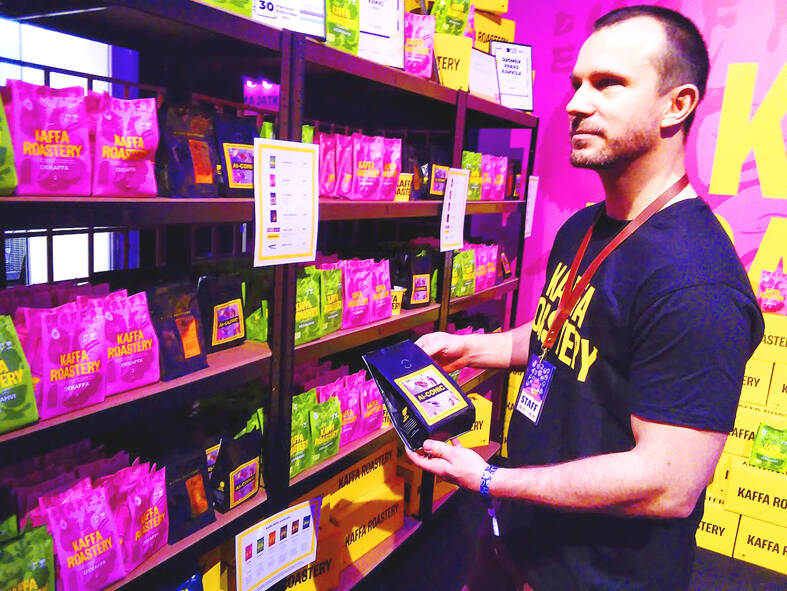An artisan roastery based in the capital of Finland has introduced a coffee blend developed by artificial intelligence (AI) in a trial in which it is hoped that technology can ease the workload in a sector that traditionally prides itself on manual work.
It is only apt that the Helsinki-based Kaffa Roastery’s “AI-conic” blend was launched last week in Finland.
The Nordic nation of 5.6 million consumes the most coffee in the world, at 12kg per capita annually, International Coffee Organization data showed.

Photo: AP
The blend — an AI-picked mixture with four types of beans, dominated by Brazil’s velvety Fazenda Pinhal — is the end result of a joint project by Kaffa, Finland’s third-largest coffee roastery, and local AI consultancy Elev.
“Leveraging models akin to ChatGPT and Copilot, the AI was tasked with crafting a blend that would ideally suit coffee enthusiasts’ tastes, pushing the boundaries of conventional flavor combinations,” Elev said.
The two partners wanted to trial how AI and its different tools could be of help in coffee roasting, a traditional artisan profession that is highly valued in Finland, Kaffa Roastery managing director and founder Svante Hampf said on Saturday.
“We basically gave descriptions of all our coffee types and their flavors to AI and instructed it to create a new exciting blend,” Hampf said during the Helsinki Coffee Festival that brings together roasteries and coffee aficionados annually.
In addition to coming up with its chosen mixture of beans from Brazil, Colombia, Ethiopia and Guatemala, AI created the coffee package label and a detailed taste description saying “AI-conic” is “a well-balanced blend of sweetness and ripe fruit.”
Hampf said he was surprised that AI “somewhat weirdly” chose to make the blend out of four different types of coffee beans, rather than the usual two or three, which allows distinction in taste between flavors from different origins.
However, after the first test roasting and blind testing, Kaffa’s coffee experts agreed that the tech-assisted blend was perfect and did not need human adjustments.
“AI-conic is a tangible example of how AI can introduce new perspectives to seasoned professionals,” Elev spokesman Antti Merilehto said while he offered coffee lovers new taste experiences.
Kaffa Roastery said that it hopes the trial can serve as a dialogue opener between coffee professionals of things to come in the future in Finland, a nation that has a strong coffee culture and a passion for technology with a flourishing start-up scene.

Vincent Wei led fellow Singaporean farmers around an empty Malaysian plot, laying out plans for a greenhouse and rows of leafy vegetables. What he pitched was not just space for crops, but a lifeline for growers struggling to make ends meet in a city-state with high prices and little vacant land. The future agriculture hub is part of a joint special economic zone launched last year by the two neighbors, expected to cost US$123 million and produce 10,000 tonnes of fresh produce annually. It is attracting Singaporean farmers with promises of cheaper land, labor and energy just over the border.

US actor Matthew McConaughey has filed recordings of his image and voice with US patent authorities to protect them from unauthorized usage by artificial intelligence (AI) platforms, a representative said earlier this week. Several video clips and audio recordings were registered by the commercial arm of the Just Keep Livin’ Foundation, a non-profit created by the Oscar-winning actor and his wife, Camila, according to the US Patent and Trademark Office database. Many artists are increasingly concerned about the uncontrolled use of their image via generative AI since the rollout of ChatGPT and other AI-powered tools. Several US states have adopted

A proposed billionaires’ tax in California has ignited a political uproar in Silicon Valley, with tech titans threatening to leave the state while California Governor Gavin Newsom of the Democratic Party maneuvers to defeat a levy that he fears would lead to an exodus of wealth. A technology mecca, California has more billionaires than any other US state — a few hundred, by some estimates. About half its personal income tax revenue, a financial backbone in the nearly US$350 billion budget, comes from the top 1 percent of earners. A large healthcare union is attempting to place a proposal before

KEEPING UP: The acquisition of a cleanroom in Taiwan would enable Micron to increase production in a market where demand continues to outpace supply, a Micron official said Micron Technology Inc has signed a letter of intent to buy a fabrication site in Taiwan from Powerchip Semiconductor Manufacturing Corp (力積電) for US$1.8 billion to expand its production of memory chips. Micron would take control of the P5 site in Miaoli County’s Tongluo Township (銅鑼) and plans to ramp up DRAM production in phases after the transaction closes in the second quarter, the company said in a statement on Saturday. The acquisition includes an existing 12 inch fab cleanroom of 27,871m2 and would further position Micron to address growing global demand for memory solutions, the company said. Micron expects the transaction to